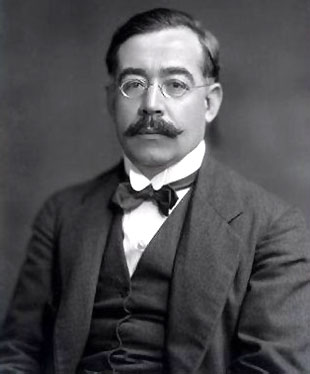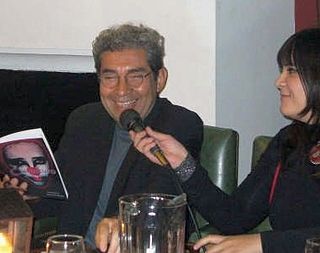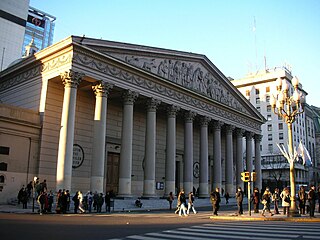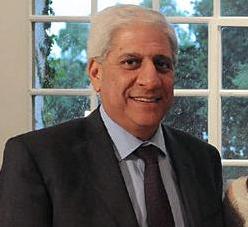
Leopoldo Antonio Lugones Argüello was an Argentine poet, essayist, novelist, playwright, historian, professor, translator, biographer, philologist, theologian, diplomat, politician and journalist. His poetic writings are often considered to be the founding works of Spanish-language modern poetry. His short stories made him a crucial precursor and also a pioneer of both the fantastic and science fiction literature in Argentina.

Santiago del Estero, also known simply as Santiago, is a province in the north of Argentina. Neighboring provinces, clockwise from the north, are Salta, Chaco, Santa Fe, Córdoba, Catamarca and Tucumán.

El Mundo, before El Mundo del Siglo Veintiuno, is the second largest printed daily newspaper in Spain. The paper is considered one of the country's newspapers of record along with El País and ABC.

Santiago del Estero is the capital of Santiago del Estero Province in northern Argentina. It has a population of 252,192 inhabitants, making it the twelfth largest city in the country, with a surface area of 2,116 km2. It lies on the Dulce River and on National Route 9, at a distance of 1,042 km north-northwest from Buenos Aires. Estimated to be 455 years old, Santiago del Estero was the first city founded by Spanish settlers in the territory that is now Argentina. As such, it is nicknamed "Madre de Ciudades". Similarly, it has been officially declared the "mother of cities and cradle of folklore."

Julio Carreras (h) (born August 19, 1949) is an Argentine author of 12 books and former guerrilla fighter.

Homero Nicolás Manzione Prestera, better known as Homero Manzi was an Argentine tango lyricist, author of various famous tangos.

La Nación is an Argentine daily newspaper. As the country's leading conservative newspaper, La Nación's main competitor is the more liberal Clarín. It is regarded as a newspaper of record for Argentina.

El Espectador is a newspaper with national circulation within Colombia, founded by Fidel Cano Gutiérrez on 22 March 1887 in Medellín and published since 1915 in Bogotá. It changed from a daily to a weekly edition in 2001, following a financial crisis, and became a daily again on 11 May 2008, a comeback which had been long rumoured, in tabloid format. From 1997 to 2011 its main shareholder was Julio Mario Santo Domingo.

Carlos Arturo Juárez was an Argentine politician, Justicialist Party governor or ruler by proxy of Santiago del Estero Province over a 55-year period, leading to his description as a caudillo.

The Metropolitan Archdiocese of Buenos Aires is a Latin Church ecclesiastical territory or archdiocese of the Catholic Church in Argentina. It is a metropolitan archdiocese with 13 suffragan sees in the country, including two Eastern Catholic eparchies.

Canal 7 is an television station broadcasting from Santiago del Estero, Argentina and carries programs from Telefe. Founded in 1962 and beginning operations, it was the second station in the country to start broadcasting in color. Currently, it shows most of the network's programs, aside from the weekend cartoons which are preempted as the station doesn't start weekend programming until noon. It also chooses not to show one or two primetime shows, instead showing local interest programs.

The Revolution of 1851 was an attempt by Chilean liberals to overthrow the conservative government of president Manuel Montt and repeal the Chilean Constitution of 1833. After various battles and sieges, by late December 1851 government forces had subdued the revolutionaries.

El Mundo was a daily morning paper published in Buenos Aires, Argentina by Editorial Haynes company. It was launched on 14 May 1928 and circulated until mid-1967, when there was an unsuccessful attempt to convert it into an evening paper. Its publication during the Infamous Decade (1930–1943) provided reporting at a time of instability and repression. After Juan Perón's election in 1946, the publishing company was taken over by Peronistas, who forced the paper to take their line.

Bernabé Aráoz was a governor of Tucumán Province in what is now Argentina during the early nineteenth century, and President of the short-lived Republic of Tucumán.
Oscar Soria is an Argentinian political activist, social journalist, and environmental and human rights campaigner, currently serving as a campaign director in the international activist group Avaaz. Previously he was the global brand director of Greenpeace and afterwards the senior media and external relations director of WWF.

Alberto Emilio Nadra is an Argentine politician, writer and journalist of Marxist formation. He stood out as a human rights activist and also in the constitution of the Argentine Youth Political Coordination between 1970 and 1980.

Agustina Palacio de Libarona was a 19th-century Argentine writer, storyteller, and heroine. A member of an elite family from Santiago, her husband was Capt. José María Libarona. She became known in her province for facing the federal leader and governor of Santiago del Estero, Juan Felipe Ibarra, who had imprisoned Capt. Libarona. Palacio's writing recounted in detail the hardships suffered by her and her husband, which ultimately led to the death of Capt. Libarona.
Oreste Edmundo Pereyra was an Argentine novelist, short-story writer, essayist, poet and teacher. He wrote many fictional books as well as educational manuals of great importance in his country.

José Emilio Neder is an Argentine politician, currently serving as a National Senator for Santiago del Estero since 2019. He belongs to the Justicialist Party, and has formed part of the Civic Front for Santiago since its foundation in 2005.

Estela Mary del Rosario Neder is an Argentine nutritionist and politician, currently serving as National Deputy elected in Santiago del Estero since 2017. She is a member of the Civic Front for Santiago (FCpS). She sits in the Frente de Todos parliamentary bloc.


















